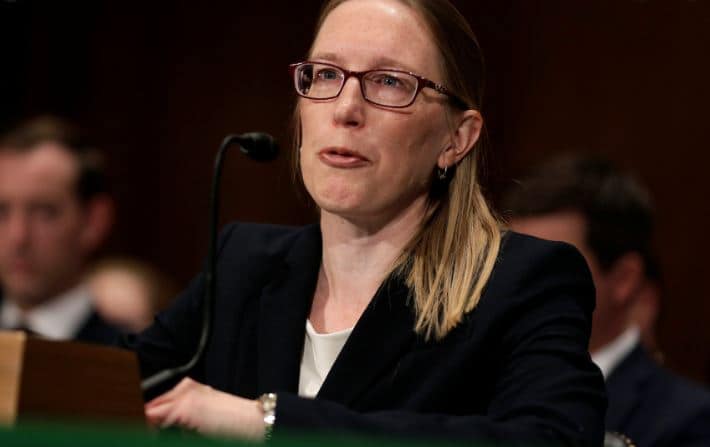SEC Commissioner Hester Peirce, famously known as “crypto mom” due to her years-long supportive attitude toward the industry, slammed the top US securities watchdog for failing to greenlight spot bitcoin ETFs. She said the organization should have proactively provided guidelines and regulatory clarity for funds and exchanges that aim to launch such a product.
On Spot Bitcoin ETPs
In her latest speech published on the SEC’s website, she urged the Commission to “stop denying” spot crypto exchange-traded products. She argued that in the past 13 years, bitcoin has grown into a mature and liquid asset that attracts investors from a wide range of backgrounds.
As the adoption rate among institutions continues to rise and spot-based ETPs have been approved in Canada and other countries, the Commission should follow along.
Until this year, she said, all approved futures-based Exchange-Traded Products (ETPs) fell under the 1940 Act. However, in April this year, the Commission approved the first non-1940 Act ETP holding bitcoin futures for listing and trading on an exchange.
Peirce believes the SEC has displayed double standards as it had approved a bitcoin futures-based ETF in 2021 while still impeding the listing of a spot-based product in the country.
Regarding the SEC’s concern about market manipulation, fraud, and the underlying bitcoin market, Peirce explained that the futures and spot ETPs are fundamentally two similar products. If one can be granted, then the other should be as well:
“The reasoning underlying the Commission’s denials of spot bitcoin ETPs is itself general and conclusory, which makes it difficult to know how approval could be achieved.”
Further, Peirce refuted that a spot bitcoin ETP would expose retail investors to a risky asset since she believes they could gain exposure to bitcoin through other means regardless. Instead of posing unnecessary barriers for funds and exchanges to launch such a product – she added – the authority should see it as a complementary product to the growing demand for the primary cryptocurrency.
“This kind of product, depending on how it is designed, could enable retail investors to gain exposure to bitcoin through a securities product that, because of the effective ETF arbitrage mechanisms, likely would track the price of spot bitcoin closely. It likely would be inexpensive to manage such a fund, so fees likely could be low.”
In addition, She criticized the watchdog for trying to cobble up a regulatory framework through enforcement action, citing the recent $100m BlockFi settlement with the SEC and 32 states as an example of enforcement actions cutting ahead of the regulatory process.
Grayscale’s Fight With the SEC
Grayscale – the world’s largest Bitcoin fund – has expressed unconcealed interest in launching a bitcoin ETF, pressing the top watchdog to permit such a long-delayed product launch. Earlier this year, the fund threatened a lawsuit against the SEC if the ETF was disapproved again by the agency.
Grayscale CEO Michael Sonnenshein shared a similar stance as Peirce’s. He viewed the Commission as failing to treat two products alike – futures ETFs and spot ETFs – through an equivalent criterion. As such, he argued that if the Commission rejects Grayscale’s application, it may have violated the Administrative Procedure Act.
Binance Free $100 (Exclusive): Use this link to register and receive $100 free and 10% off fees on Binance Futures first month (terms).
PrimeXBT Special Offer: Use this link to register & enter POTATO50 code to receive up to $7,000 on your deposits.


